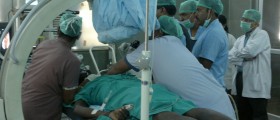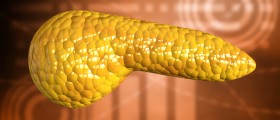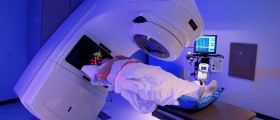
Pancreatitis is a medical condition characterized by inflammation of the pancreas. Pancreas is a large gland situated in the upper abdominal region. Pancreas lies behind the stomach and right next to the duodenum, which is the first part of the small intestine. Pancreas plays an important role in human digestion, since it secretes digestive enzymes into the duodenum. These juices mix with semi-digested food and help the body absorb all of the important nutrients. Another important role of the pancreas is to secrete insulin, which helps to keep the blood levels of glucose in the optimum levels, and helps to supply the living cells with energy.
Symptoms of pancreatitis
Pancreatitis usually begins with a pain in the upper part of the abdomen. Some of the patients may even feel pain radiating all away to their back. In most of the cases, the pain is mild and gradually increases, becoming more and more severe. For many patients, the pain is worse after eating and may also become constant and last for a couple of weeks. People with pancreatitis will feel very ill and may need medical attention. Typical symptoms include swelling and tenderness of the abdomen, nausea, vomiting, fever, and rapid pulse. This condition is associated with certain complications such as dehydration and low blood pressure.
Prevention of pancreatitis
In most of the cases, pancreatitis is not such a serious medical condition. It may be highly unpleasant and disabling, but it typically resolves in a course of just a couple of days. However, pancreas is one of the most important parts of the human body, essential for many vital processes and overall health. Only in the United States, about 210.000 people are hospitalized each year, because of the acute pancreatitis. However, for some of these patients, pancreatitis is a life-threatening disease associated with many severe complications.
One of the most frequent causes of pancreatitis is the presence of the gallstones. Gallstones are small crystalline concretions formed within the gallbladder. These stones may occasionally pass to other parts of the biliary tract, including pancreatic duct, and cause infection and inflammation. There is no certain way to prevent gallstones, but one can reduce the risk of forming them by maintaining steady and healthy weight, and eating regular and well balanced meals.
Another important cause is chronic and heavy alcohol abuse. In many cases, acute pancreatitis occurs within a couple of hours after heavy alcohol drinking. To lessen the risk of pancreatitis, one should always drink in moderation.

















Your thoughts on this
Loading...